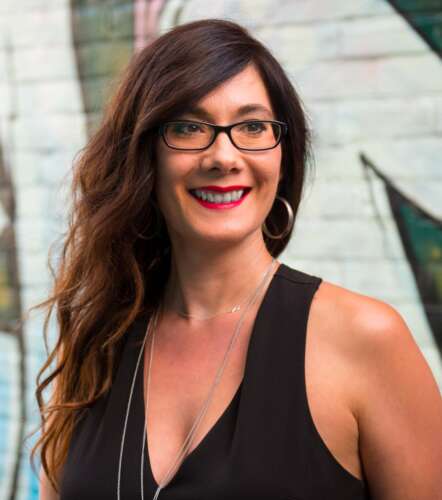“Sometimes the right thing to do is throw out the old schools of thought in the name of progress and reform.”
Taylor Swift never went to university but that doesn’t mean she hasn’t found a place in academia. So it goes that in 2022 when she spoke to the graduating class of New York University upon receiving an honorary doctorate of fine arts, she spoke of change, adding, “I never got to have the normal college experience, per se, [but] I’m a big advocate for not hiding your enthusiasm for things.”
Stepping into both enthusiasm and progress, the University of Guelph is joining a growing number of academic institutions across the world in studying the impact of Taylor Swift – songwriter, singer, performer, producer, director, businesswoman, actor, advocate, icon.
Icons of Popular Music, an OpenEd, online, general course co-designed by Dr. Alyssa Woods, professor of popular music, in the School of Fine Art and Music in the College of Arts, and Dr. Robert Edwards, scholar of religion and popular culture and U of G sessional lecturer, will be made available for the first time in Winter 2025.
Taylor Swift, invisible strings and the art of a good bridge
What makes U of G’s offering unique is that unlike other schools focusing on one aspect of Swift – her literary legacy, her use of symbolism or her savvy plan to reclaim her recordings – it will navigate the labyrinth of ways that popular music and popular culture intersect with art, literature, gender, sexuality, race, religion, politics, feminism, celebrity, fandom, business acumen, the economy and the law.

The invisible string that bridges them all is the mastermind, Miss Taylor Alison Swift. And if there is one thing she knows how to do, it is to construct the perfect bridge.
“Taylor Swift is not just a singer or a pop star,” Edwards says. “Popular music is such a pervasive element of our culture and so really any artist that rises to this level of popularity and success becomes a pervasive element of our culture.”
The 12-week course is available to any student regardless of their major – there is no pre-requisite – as well as the public. Woods and Edwards were intentional about making the course as accessible as possible. It is distance-ed, entirely online and asynchronous, meaning students will approach the content at their own pace, with no scheduled class times.
The critical thinking and analysis skills foundational to the course offer a different way to approach critical engagement, which extends to an education of any discipline, Woods says.
“That’s the core,” she explains. “Taylor Swift is like a case study, or a lens to look at this through. It really speaks to the interdisciplinary nature of popular music studies.”
The end game here is a course designed for flexibility so that down the road, each learning module can be adapted and applied evermore to similar global icons.
U.S. politics, The Eras Tour and Taylor Swift criticism
And to those who “gonna hate, hate, hate,” the pair say that type of criticism is nothing new to educators who have spent their career advocating for the value of an arts and humanities education.
“There is intrinsic value to the conversations we’ll be having,” Edwards says. “It’s not just talking about Taylor Swift. We’re talking about the current state of politics in the U.S., how Taylor engages with and affects the body image of teens, how The Eras Tour has shifted the way tickets sales now work for all concerts.”
Like the Swiftposium that took place earlier this year in Australia, you can dissect Swift’s lyrics looking for symbolism where metaphor abounds, explore her decision to re-record her first six albums so they remain in her ownership, remark at the way she brings people of all ages and races together in a shared experience of girlhood that embraces all genders and truly embodies inclusivity, authenticity and joy, or observe how her brand brings millions of dollars to local economies on tour stops, the music business in general and even the NFL.
Long story short; Icons of Popular Music will cover it all.
“The fact that we’re seeing this with a female artist is not insignificant,” Woods says. “She writes her own music and controls a lot of the elements of her identity, her business and her brand. This is a mass cultural impact we are witnessing.”
When Swift speaks, an unprecedented number of people are listening, Edwards points out. “It begs the larger question – does she affect a fundamental ideological worldview shift in people?”
Perhaps that is a question already answered all too well, in another signature Easter egg, by Swift herself.
“Everything I do is an extension of my writing,” she told that NYU class back in 2022. “It’s just a continuation of the idea that we are so many things, all the time.”
Contact:
Dr. Alyssa Woods
awoods08@uoguelph.ca
